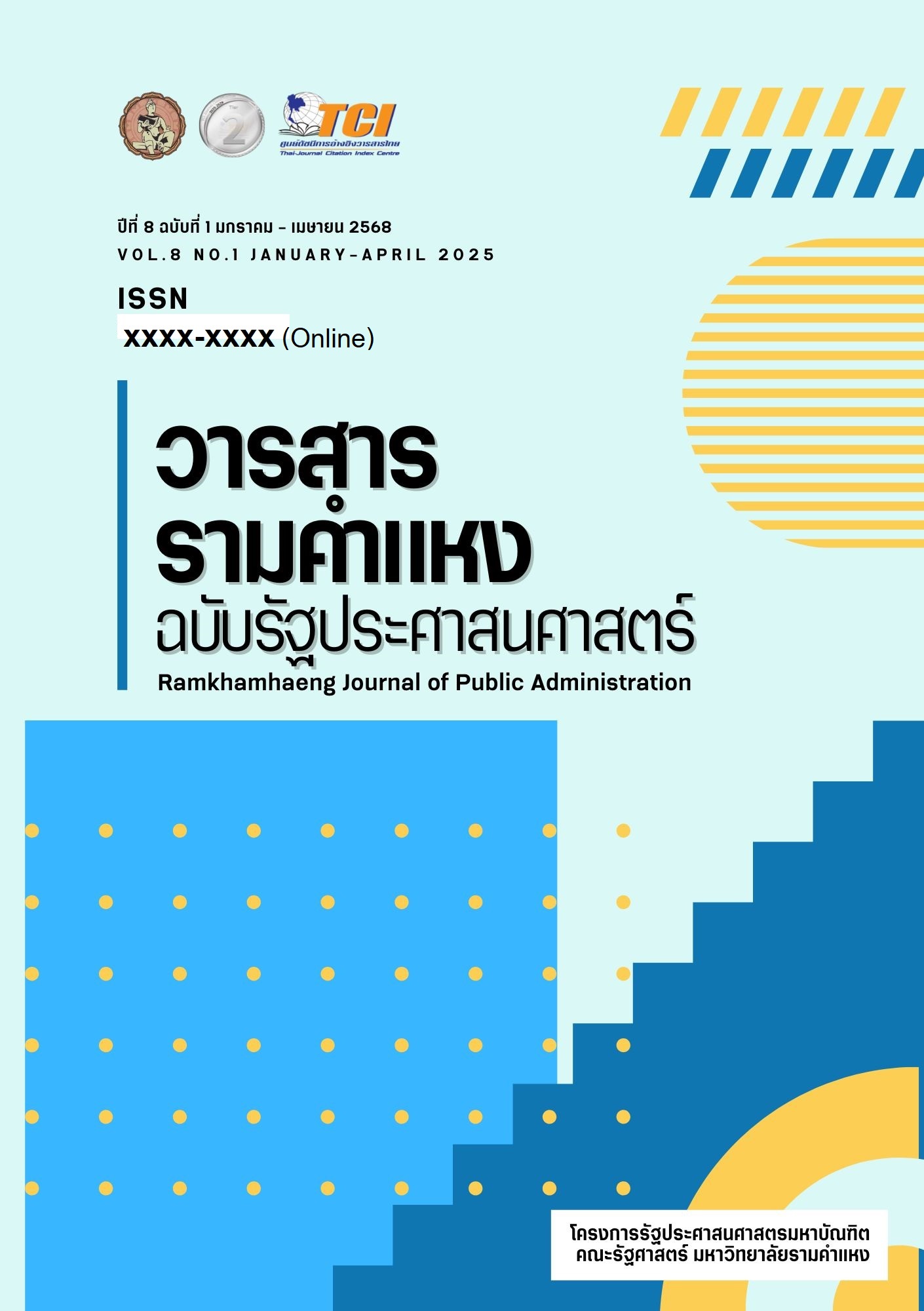The political participation of students of Suan Sunandha Rajabhat University, Nakhon Pathom Campus, in the 2023 general election
Keywords:
Participation ; politics ; ElectionAbstract
The purposes of this study are to 1) study the political participation of students at Suan Sunandha Rajabhat University Nakhon Pathom Campus in the election of members of the House of Representatives 2023 2) analyze factors influencing political participation of the students and 3) propose guidelines for promoting political participation of the students. Sample group Included students of Suan Sunandha Rajabhat University Nakhon Pathom Campus. The research results found that most of the respondents were female at the ages of 17-29 years, studying at Level 1, the overall picture of their political participation is at a high level, while democratic political ideology plays the most influential role. It also found that political socialization, family influence, and perception of the importance of elections played a significant influence on student political participation at the .001 level.
References
กองบริการการศึกษา มหาวิทยาลัยราชภัฏสวนสุนันทา. (2567). รายงานจำนวนนักศึกษาลงทะเบียนประจำปีการศึกษา 2567. สืบค้นเมื่อ 26 มิถุนายน 2563, จาก https://reg.ssru.ac.th/isqy12
พรรชรนันท์ สายจันดี และคณะ (2565). การรับรู้ทางการเมือง การกล่อมเกลาทางการเมืองและการมีส่วนร่วมทางการเมืองของเยาวชนในประเทศไทย. วารสารพุทธปรัชญาวิวัฒน์, 6(1), 26-40.
สำนักงานคณะกรรมการการเลือกตั้ง.(2562). จำนวนผู้มีสิทธิเลือกตั้งประจำปี 2562. สืบค้นเมื่อ 26 มิถุนายน 2563, จาก www.egt.go.th.
อรณิช รุ่งธิปานนท์. Hot Issue (ธ.ค.2560) [คน รุ่น ใหม่กับการเป็นสมาชิกรัฐสภา]. สืบค้นเมื่อ 26 มิถุนายน 2563, จาก https://dl.parliament.go.th/handle/20.500.13072/521145
Akilarasan.S & Dr. Birendi (2024). Social Media and Young Voters, A Case Study of Punjab. Educational Administration: Theory and Practice, 30(6), 2546-2551.
Aleksandra, Furman., Dagmara, Szczepańska., Dominika, Maison. (2022). The role of family, peers and school in political socialization: Quantitative and qualitative study of Polish young adults’ experiences. Citizenship Teaching and Learning, 17(1), 123-143.
Avril, Keating., Gabriella, Melis. (2017). Social media and youth political engagement: Preaching to the converted or providing a new voice for youth?. The British Journal of Politics and International Relations, 19(4), 877-894.
Ananda, A., & Gistituati, N. (2020, August). Impact of Political Education to the Participation of Beginner Voters in General Election. In International Conference on Social Studies, Globalisation and Technology (ICSSGT 2019) Amsterdam: Atlantis Press.
Casteltrione. (2017). Facebook and political participation: Going beyond over-optimistic predictions. 15(1), 131-148.
Dimitrova, D. V., Shehata, A., Strömbäck, J., & Nord, L. W. (2014). The effects of digital media on political knowledge and participation in election campaigns: Evidence from panel data. Communication research, 41(1), 95-118.
Djumadin, Z. (2021). Student Political Participation and the Future of Democracy in Indonesia. AL-ISHLAH Journal Pendidikan 13(3), 2399-2408.
Flores, K., Dumaguin, C., Dumo, G. G., Fontanilla, A. Z., & Nisperos, K. A. (2022). Social Media as a Transformative Agent of Political Behavior Among Political Science Students in a Component City. American Journal of Multidisciplinary Research and Innovation, 1(2), 78-85.
Grace, U., & Danfulani, J. (2015). Political participation as a catalyst for national development in a democratic society. Research on Humanities and Social Sciences, 5(14), 56-62.
Jinhuang, W., & Zhenzhen, Z. (2022). Analysis on the Micro-environment of Ideological and Political Education in Colleges and universities. International Journal of New Developments in Education 4(6), 44-50.
Kiess, J. (2021). Learning by doing: The impact of experiencing democracy in education on political trust and participation. Politics, (42), 75 - 94.
Liu, H. (2020). Analysis on the Effective Linkage of Ideological and Political Education and Family Education in Universities. Retrieved December 14, 2023, from https://doi.org/10.18686/AHE.V4I8.2566.
Lorenz-Spreen, P., Oswald, L., Lewandowsky, S., & Hertwig, R. (2023). A systematic review of worldwide causal and correlational evidence on digital media and democracy. Nature human behaviour, 7(1), 74-101.
Lee, S., & Xenos, M. (2019). Social distraction? Social media use and political knowledge in two US Presidential elections. Computers in human behavior, 90, 18-25.
Marchand, A., Frisby, M., Kraemer, M., Mathews, C., Diemer, M., & Voight, A. (2021). Sociopolitical Participation Among Marginalized Youth: Do Political Identification and Ideology Matter?. Journal of Youth Development. 16(5), 41-63.
Milbrath. L. W. and Goel.(1977). Political Participation: How and Why Do People Get Involved in Politics. (2nd ed.), Chicago:Rand McNally College Publishing Company.
Rauf, T. (2021). How College Makes Liberals (or Conservatives). SOCIUS, 7. 1-13.
Downloads
Published
How to Cite
License
Copyright (c) 2025 นฤชา นราผ่อง, ไวพจน์ กุลาชัย

This work is licensed under a Creative Commons Attribution-NonCommercial-NoDerivatives 4.0 International License.



